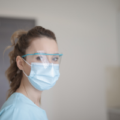Doctor to take the stand at COVID-19 Inquiry to expose UK officials
Next week public hearings commence for Module 3 of the COVID-19 Inquiry, with a focus on the experience of healthcare during the pandemic. An eminent medic will take the stand on September 12th at the COVID-19 Inquiry to give testimony of how UK healthcare officials have systematically denied overwhelming scientific evidence that COVID-19 is airborne.
Dr Barry Jones chairs the COVID-19 Airborne Transmission Alliance (CATA) which is a Core Participant in the UK COVID-19 Inquiry. The Alliance includes professional associations representing 65,000 healthcare workers as well as individual experts. Since 2020, CATA’s membership have been seeking to persuade UK Health Officials to align national guidance to the scientific facts about how the disease is transmitted and how healthcare workers need to be protected from infection.
He will also challenge official assertions that healthcare workers did not need respiratory protective equipment when working close to infected patients or in poorly ventilated areas, except in an arbitrary set of situations. This position reveals the startling fact that since the outset of the pandemic, and despite all the evidence, health officials in the UK stubbornly continue to deny airborne transmission of the disease.
Proportionately, the UK reported a higher death rate of healthcare workers in the initial phase of the pandemic than almost anywhere in the world. In line with CATA’s evidence for Module 1, the COVID Inquiry has already determined that the UK “prepared for the wrong pandemic” – one that is largely transmitted by droplets and touch.
As a result billions of pounds were wasted on inappropriate PPE. This ineffective PPE resulted in thousands of healthcare workers becoming infected in the workplace and transmitting Covid-19 to patients and co-workers. Not only were healthcare workers refused access to Respiratory Protective Equipment (RPE), but many were instructed to remove their own RPE, including those working in close quarters with infected patients and some staff were disciplined for asking for suitable RPE.
“The way in which healthcare workers were abandoned to their fates and their professional knowledge was disregarded has left a scar on the UK’s healthcare system,” says Kamini Gadhok, former CEO of the Royal College of Speech and Language Therapists and Vice Chair of CATA. “The mental health crisis in the NHS and staff shortages all have their roots in the disregard for life and expertise that professionals experienced through the pandemic.”
CATA’s ongoing concern has been that Health and Safety regulations and scientific principles were set aside through the pandemic in favour of Infection Protection and Control (IPC) guidance which did not even take account of advice from the Government’s own scientific experts.
Dr Barry Jones, Chair of CATA, is clear that “those responsible for the IPC guidance failed our healthcare workers, failed our patients and failed our communities.” The guidance stated that COVID-19 transmission was caused by large droplets and touch and that respiratory protective equipment was only needed to protect against a small class of medical procedures, known as aerosol generating procedures.
The guidance was produced by the shadowy “IPC Cell” which was formed at the outset of the pandemic. It is still not known who made up the IPC Cell, which was not part of the UK’s official planned pandemic infrastructure. Nor are records of its meetings available to the public, although some have been obtained by Freedom of Information requests. Its precise reporting and accountability structures are also unclear.
From the time the IPC Cell was created, early in 2020 until it was disbanded in 2022, it refused to consider evidence and concerns from health professions, scientists or even those within Government which deviated from the position the Cell had taken from the outset, namely that COVID was not an airborne disease and therefore RPE was largely unnecessary for most healthcare workers – even those working at close quarters with infected patients.
“As a medical practitioner, I defy anyone to tell me that when you are resuscitating an infected patient or inserting a feeding tube which always elicits a cough, you are not going to be at risk of contracting that respiratory infection,” says Dr Barry Jones. “Yet this is what the health officials are still telling telling us, despite our years of practical experience and the catastrophe that we were seeing unfolding before our eyes. It is important to note that almost all patient care requires the HCW to be within the danger zone of 1metre from the patient as we don’t have arms longer than 1 m!”
The dominance of the IPC Guidance is held in contrast with the absence of meaningful health and safety regulation in healthcare through the pandemic. CATA have already highlighted their concerns that the protections from the foreseeable risk of airborne infection was not provided consistently by all healthcare providers. A key concern has been that the Health and Safety Executive, the regulator for protection from hazards including airborne viruses and RPE was not effectively engaged with healthcare during the pandemic.
“Protections like RIDDOR (the Reporting of Injuries, Diseases and Dangerous Occurrences Regulations), the reporting mechanism which provides employees with an official record of diseases acquired through their work, was largely abandoned in healthcare during the pandemic,” says David Osborn, member of the CATA Executive Team and Health and Safety expert. “The normal principles of health and safety protection that any worker can expect were simply not applied to healthcare workers – our most important national asset during a health emergency. Healthcare workers and employers were left exposed and unsupported. It seems that the HSE believe they are entitled to switch legally binding duties on and off at will. Health and Safety law exists for the benefit of workers, not for the convenience of the HSE as they appear to think.”
While the message of CATA has been consistent, simple and almost unarguable, the institutional resistance to facts of biology and physics has been considerable. In June 2021, in an unprecedented effort to have the voice of over a million healthcare workers heard, over 17 professional bodies and unions, including CATA, the BMA, RCN, RCM, RPS, GMB, UNITE challenged the IPC position in a meeting with government and healthcare officials. But their clinical expertise, scientific evidence and judgements based on frontline observations were disregarded. CATA want the Inquiry to examine how governance failed, scientific evidence was distorted or ignored and stakeholders were just seen as a problem to be ‘managed’. They also want to know why the Government refuses to make notes or minutes of that meeting publicly available.
“In times of national crisis, we know difficult decisions have to be made and messages may need to be managed to protect the public from panic,” says Professor Kevin Bampton, a former UN constitutional adviser and CEO of the British Occupational Hygiene Society, the UK’s Chartered worker health protection body and member of the CATA Executive Team. “But there are supposed to be checks and balances in place to ensure that the Rule of Law is not set aside and decision-makers are accountable and overseen. This seems to have been overlooked in the panic. The experience of healthcare during the pandemic sits alongside a sad history in recent years, including the Infected Blood Scandal, Hillsborough and the Post Office Horizon Scandal. In common with these, the weight of State was brought to bear against the truths they were asserting in a concerted and almost irresistible way. We can’t leave the UK’s health infrastructure vulnerable to such forces again in the future. As things currently stand, the UK is completely unprepared and ill-equipped to cope with the next pandemic whenever that may strike. As Baroness Hallett has reminded us – it is not a question of if we get another pandemic but when.”
***Notes for Editors***
Stephen Simblet KC will be making opening submissions for CATA on 9th September as Module 3 gets underway.
More information about CATA and its Module 1 submission can be found at UK Covid-19 Inquiry – CATA witness statement published | BAPEN
CATA’s opening submission and subsequently full written evidence will be published by the Inquiry on its site Impact of Covid-19 Pandemic on Healthcare Systems in the 4 Nations of the UK (Module 3) – Preliminary Hearings – UK Covid-19 Inquiry (covid19.public-inquiry.uk)
Press enquiries may be made to kevin.bampton@bohs.org
*CATA members
British Association for Parenteral & Enteral Nutrition
British Occupational Hygiene Society
Royal College of Speech and Language Therapists
Queens Nursing Institute
Association for Respiratory Technology & Physiology
British Dietetic Association
British and Irish Association of Stroke Physicians
British Society of Gastroenterology
College of Paramedics
Doctors Association UK
National Nurses’ Nutrition Group
Patient Safety Learning
Mr David Osborn
Dr David Tomlinson
Mr Geraint Jones
Dr Gillian Higgins
Dr Nathalie MacDermott
Dr Tom Lawton
Dr Marianne Tinkler




